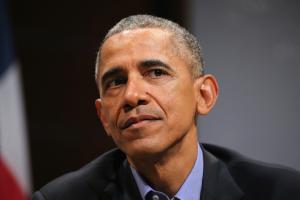Several staffers from Democratic presidential nominee Hillary Clinton’s campaign held an invitation-only conference call with 1,000 current and former aides to President Barack Obama on Wednesday night. During the “off-the-record” conversation, Clinton’s director of states and political engagement, Marlon Marshal, discussed Republican nominee Donald Trump’s tendency to “spout off at the mouth” and its effect on the race.
“Obviously, I don’t need to tell you all Donald Trump is kind of tripping on himself right now and continues to say just things that no one running for no one should say, period. But particularly if you’re running for the office of president of the United States,” Marshall said in an apparent reference to recent remarks Trump has made that drew criticism in the media and among members of the Republican party.
Yahoo News listened to the call, which featured Marshall and other staffers discussing Clinton’s plans for the next month and her challenges with wooing young voters. At multiple points during the call, Clinton’s relentlessly cheerful staff asked the Obama alumni to use weeks of their vacation time to become what they called “Clinton closers” and volunteer for the campaign in the final months of the election.
Marshall warned that Clinton supporters “have a lot of work to do” to ensure victory even though Trump continually courts controversy.
“Those thoughts and those statements are just not worthy of the office,” Marshall said of Trump’s comments. “That being said, this election, we cannot just leave it to Donald Trump’s mouth to assume this election is all said and done.”
The conference was declared “off the record and not for press purposes,” and was reportedly intended for people who were Obama administration staffers, appointees and people who worked on the president’s 2008 and 2012 campaign staff.
Marshall said a major purpose of the call was to generate a “sense of urgency” and prevent complacency among Clinton supporters.
“I think sometimes when, you know, you see some of the craziness from the other side, it’s like, ‘Oh, OK, you know, Hillary should win,’” Marshall said. “We cannot be deterred from doing the organizing that we need to be successful. We want to engage all of you in getting involved in that organization.”
Lauren Crawford, the campaign’s director of expansion state programs came on next and detailed ways the conference call listeners could volunteer for Clinton. Given their experience working for Obama, Crawford said the people on the call would be “super vols.” She encouraged them to phone bank and to travel to battleground states, but she said the biggest way to help would be as a “Clinton Closer.”
“We’re here because you’re the all-stars and you’re going to go above and beyond. … We’re asking you to take time off that you can in October and November,” Crawford explained.
Crawford said the listeners would get a “follow-up email” where they could sign up to join the “Clinton Closer” volunteer program.
“That’s someone who can take two, three, four weeks. I mean, I might even ask for six if you’re feeling, you know, ambitious. Someone who can go into any of our states [to] really help,” Crawford said.
Another staffer later encouraged the people on the call to “make sure you have saved up some vacation time” to volunteer for Clinton in the fall.
Marshall also pointed out that the Clinton campaign is “hiring” for paid positions. He offered the listeners a preview of the campaign’s plans for August and said it would be an “economic month,” with Clinton and her running mate, Virginia Sen. Tim Kaine, traveling the country and “driving home our economic message.” Marshall said this would include outlining Clinton’s economic platform and attacking Trump for some of his businesses that sell products that aren’t made in America.
“Sometimes, he can spout off at the mouth for certain things, but people also think he’s a successful business person,” Marshall said of Trump. “We’re going to remind voters more of the economy that Hillary Clinton wants to build as president of the United States. But also, Trump’s success really comes at the expense of others. … He talks about ‘Made in America’ or ‘Make America Great Again.’ That should start with the things that he has that he sells, which are actually made in other countries.”









